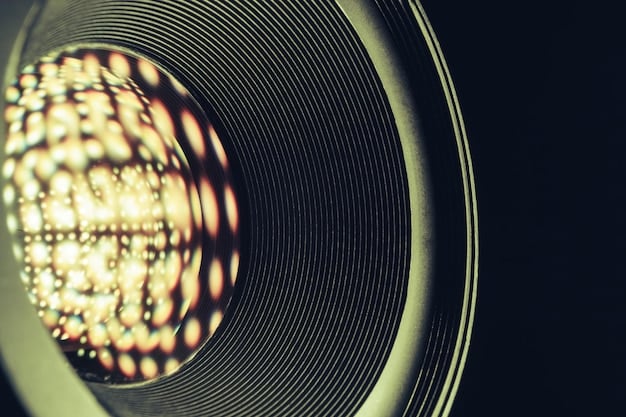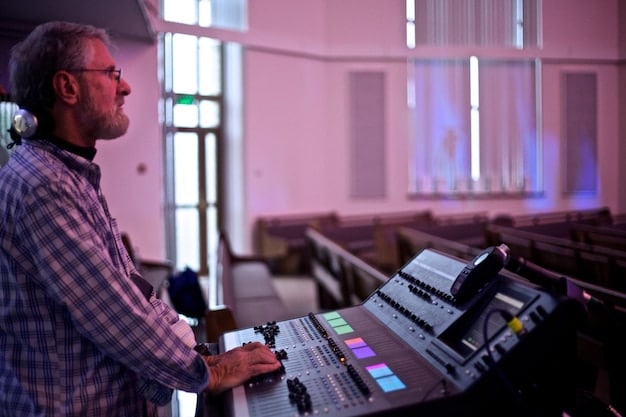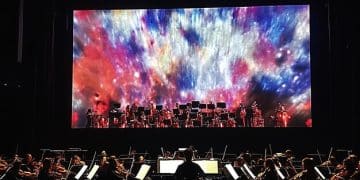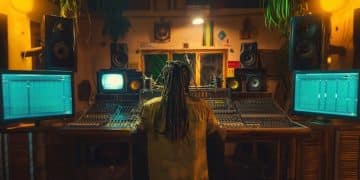The Art of Short Film Scores: Music’s Role in Storytelling

The art of the short film score lies in its ability to amplify storytelling and captivate US viewers through carefully crafted music that enhances emotional impact and narrative depth.
Unleash the power of music in your short films! Discover how the art of the short film score can transform your storytelling and deeply resonate with US audiences.
The Power of Music in Short Films
Music is a universal language with the power to evoke emotions, build tension, and create atmosphere. In short films, where time is limited, the score plays a particularly crucial role. It can convey complex emotions and narratives swiftly, deeply impacting viewers.
A well-crafted score enhances the storytelling, guiding viewers through the emotional landscape of the film. It bridges gaps, amplifies nuances, and leaves a lasting impression that words alone cannot achieve.

Understanding the Role of the Short Film Composer
The short film composer is more than just a musician; they are an integral part of the filmmaking team. They work closely with the director to understand the story’s themes, characters, and emotional arc.
Their job involves translating the director’s vision into a musical language that supports and enhances the narrative. This requires a deep understanding of film language, music theory, and the ability to create original scores that are both effective and memorable.
Collaboration with the Director
Open communication and a shared understanding between the composer and director are fundamental. Early collaboration is essential to ensure the music aligns with the film’s vision.
Spotting Sessions
The spotting session involves the composer and director watching the film together, identifying key moments where music will have the most impact. This helps define the emotional tone and pace of the score.
The composer’s role involves understanding the director’s vision and translating it into a compelling and meaningful soundtrack, enriching the overall storytelling experience.
Elements of an Effective Short Film Score
A successful short film score is not just about melodies and harmonies; it’s about how those elements interact with the visuals and narrative. Several factors contribute to an effective score.
These include the use of themes, instrumentation, and the pacing of the music. By using these elements skillfully, the composer can create a score that elevates the emotional impact and storytelling power of the film.
- Theme Development: Using recurring musical motifs to represent characters or ideas.
- Instrumentation: Choosing instruments that match the film’s tone and setting.
- Pacing and Timing: Ensuring the music complements the film’s rhythm and emotional beats.
- Silence: Knowing when to use silence to enhance tension or create emotional space.
By combining themes, instrumentation, pacing, and leveraging silence, the composer can create a short film score that resonates powerfully with viewers.
Techniques for Captivating US Viewers
To resonate deeply with US audiences, composers often employ specific techniques that cater to cultural expectations and preferences. These techniques involve understanding the nuances of American storytelling and emotional expression.
By leveraging familiar musical idioms and tropes while adding a unique and original flair, composers can craft scores that feel both familiar and fresh, enhancing the viewing experience for US audiences.
Incorporating American Musical Styles
Drawing inspiration from genres like blues, jazz, country, and rock can create an immediate connection with the audience.
Using Familiar Instruments and Sounds
Instruments like the banjo, harmonica, and electric guitar can evoke uniquely American landscapes and emotions.

Composers can create scores that resonate deeply with US viewers by incorporating recognizable American musical styles and instruments while maintaining originality.
The Impact of Music on Emotional Engagement
Music has a remarkable ability to amplify emotions and create profound connections with viewers. In the context of short films, this power is even more pronounced, as every moment counts.
The strategic use of musical cues can enhance the emotional impact of key scenes, deepen character development, and create a lasting impression on the audience, making the emotional journey more immersive and memorable.
- Building Suspense: Using dissonant chords and unsettling rhythms to create tension.
- Evoking Empathy: Employing melancholic melodies to enhance emotional resonance.
- Highlighting Joy: Integrating upbeat tempos and major keys to amplify positive emotions.
- Creating Intimacy: Incorporating solo instruments and delicate arrangements for personal moments.
By skillfully building suspense, evoking empathy, highlighting joy, and creating intimacy, composers can utilize music to create a deeply engaging and emotionally resonant experience for viewers.
Case Studies: Exceptional Short Film Scores
Examining successful short films and their scores offers valuable insights into effective music composition. These case studies illustrate how music can transform storytelling and captivate audiences.
By analyzing the scores of critically acclaimed short films, we can understand how composers use music to enhance the narrative, amplify emotional impact, and create memorable viewing experiences.
“Bao” (2018)
The score by Domee Shi beautifully complements the film’s themes of motherhood and cultural heritage, uses traditional Chinese instruments to evoke warmth and familiarity.
“Piper” (2016)
Adrian Belew’s score enhances the film’s playful animation and heartwarming story, integrating whimsical melodies and soaring orchestral arrangements to capture the joy.
These case studies demonstrate the transformative power of music in short films, highlighting the composer’s ability to elevate storytelling and engage audiences on a deeper emotional level.
Tips for Aspiring Short Film Composers
For those looking to break into the world of short film scoring, the following advice can prove invaluable. Building a strong foundation of skills, making connections, and maintaining a passion for storytelling are all key to success.
By following these tips, aspiring composers can increase their chances of creating meaningful and impactful scores that enhance the storytelling and captivate audiences worldwide.
- Study Film Language: Understand how music interacts with visuals and narrative.
- Build a Diverse Portfolio: Showcase your versatility with different genres and styles.
- Network with Filmmakers: Attend film festivals and workshops to connect with directors.
- Embrace Collaboration: Be open to feedback and willing to adapt your music to fit the film.
To become successful short film composers, it’s important to study film language, build a diverse portfolio, network with filmmakers, and embrace collaboration.
| Key Point | Brief Description |
|---|---|
| 🎶 Music’s Role | Enhances emotions & storytelling. |
| 🤝 Collaboration | Composer & director work closely. |
| 🎬 Techniques | Themes, pacing, & instrumentation. |
| 🎯 US Viewers | Incorporate American musical styles. |
FAQ
▼
Music adds emotion, depth, and nuance to the story in a short time frame, making it a powerful tool for engaging viewers quickly and effectively.
▼
The earlier, the better. Early collaboration ensures the music aligns closely with the director’s vision and the film’s overall tone.
▼
Theme development, strategic instrumentation, pacing that matches the film, and the effective use of silence enhance tension and emotion.
▼
Incorporating American musical styles like blues, jazz, or country can create familiarity and resonance with US viewers, making the content more engaging.
▼
Knowledge of film language, music theory, instrumentation and the ability to collaborate and understand director’s vision are fundamental for composers.
Conclusion
The art of the short film score is a powerful tool that enhances storytelling and captivates US viewers. By understanding the role of the composer, mastering key elements, and employing techniques that resonate with the audience, filmmakers can elevate their short films to new creative heights.





